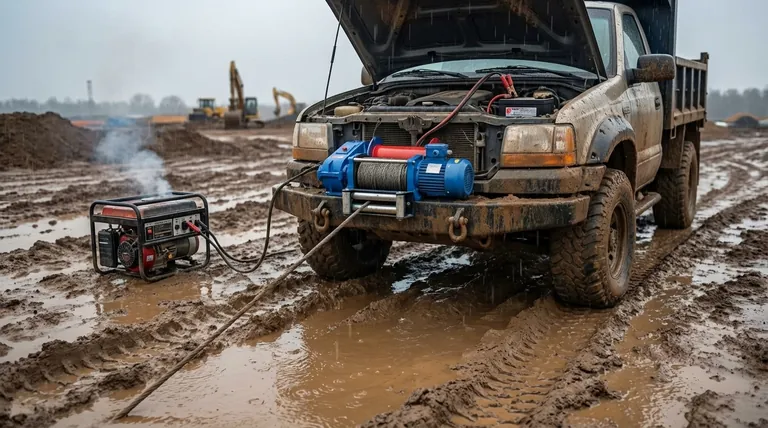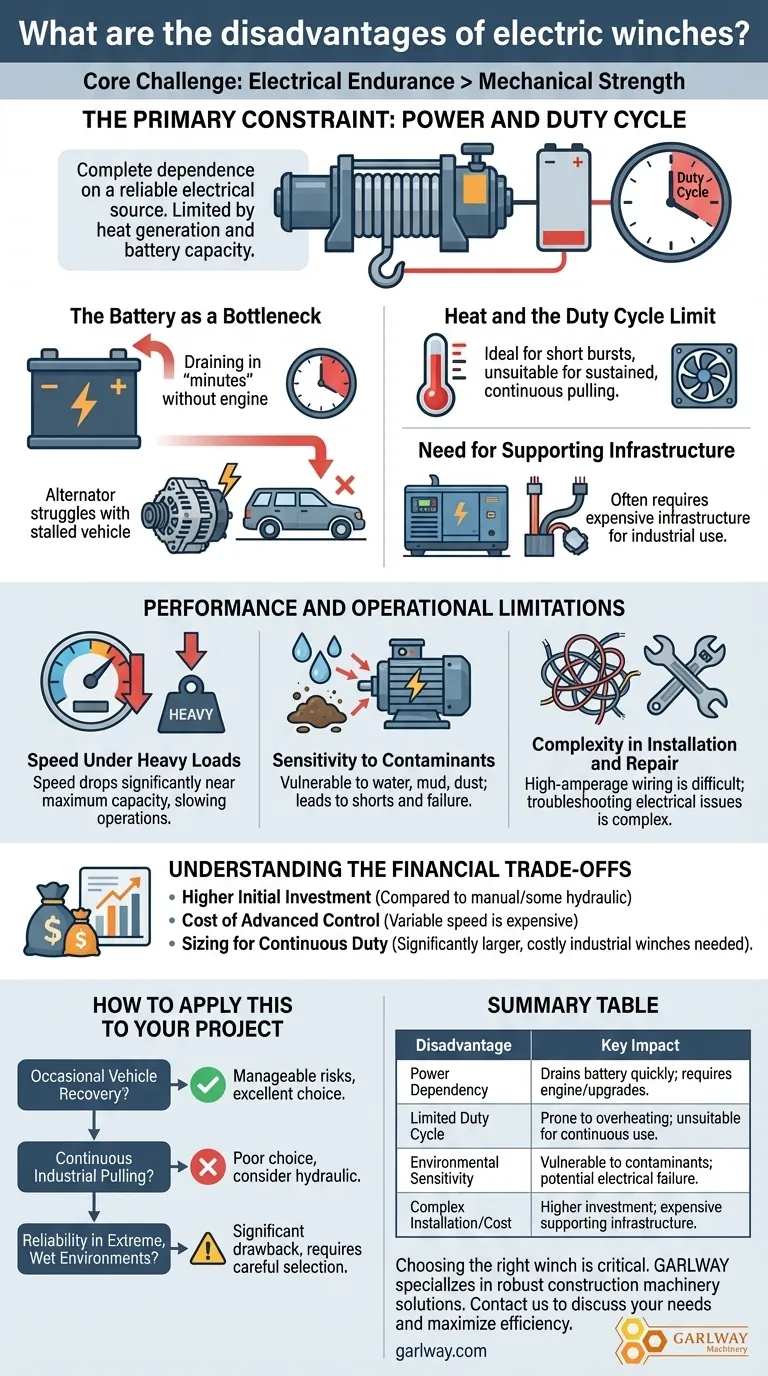While highly versatile, the primary disadvantages of electric winches stem from their complete dependence on a reliable electrical source. This leads to critical limitations in continuous operation, significant power draw that can disable a vehicle, sensitivity to environmental factors, and potentially complex and costly installation.
The core challenge of an electric winch is not its mechanical strength, but its electrical endurance. Its performance is fundamentally tied to the health and capacity of its power source, making it excellent for short, powerful bursts but less suitable for sustained, heavy-duty work cycles.

The Primary Constraint: Power and Duty Cycle
The most significant drawbacks of electric winches are not mechanical but electrical. Understanding these limitations is key to using them safely and effectively.
The Battery as a Bottleneck
An electric winch places an enormous load on an electrical system. A heavy pull can draw hundreds of amps, draining a vehicle's battery in minutes if the engine isn't running.
Even with the engine on, a stock alternator may not keep up with the power demand during a strenuous pull, leading to a depleted battery and potentially a stalled vehicle.
Heat and the Duty Cycle Limit
Electric motors generate significant heat under load. To prevent damage from overheating, they have a duty cycle—a rating that specifies how long the winch can run before it must cool down.
This makes them ideal for short bursts of work, like vehicle recovery. However, they are poorly suited for applications requiring long, continuous pulling, where a hydraulic winch would excel.
The Need for Supporting Infrastructure
For industrial or heavy-use scenarios, a simple battery connection is insufficient. These applications often require expensive infrastructure, such as large generators or upgraded vehicle electrical systems, to provide consistent power.
Performance and Operational Limitations
Beyond power constraints, electric winches have inherent operational trade-offs that can impact their effectiveness in certain situations.
Speed Under Heavy Loads
While generally fast, an electric winch's speed can drop significantly as the load approaches its maximum rated capacity. This can slow down recovery or industrial operations.
Sensitivity to Contaminants
The electric motor and its components, such as solenoids and contactors, are sensitive to water, mud, and dust. Contamination can lead to short circuits, corrosion, and premature failure.
Complexity in Installation and Repair
Installing an electric winch involves high-amperage wiring that must be routed safely. Troubleshooting electrical issues can be more complex than diagnosing mechanical problems in other winch types.
Understanding the Financial Trade-offs
While convenient, the total cost of ownership for an electric winch can be higher than anticipated, especially when compared to alternatives like hydraulic systems for specific use cases.
Higher Initial Investment
For a given capacity, a quality electric winch often represents a higher upfront cost than a manual winch and can be comparable to hydraulic systems, especially when factoring in necessary electrical upgrades.
The Cost of Advanced Control
Features like variable speed control are often more complex and expensive to implement in electric winches compared to their hydraulic counterparts, which achieve it through simpler fluid dynamics.
Sizing for Continuous Duty
If an application requires near-continuous operation, you must select a much larger, more expensive industrial-grade electric winch to handle the thermal load, significantly increasing the cost.
How to Apply This to Your Project
Choosing the right tool requires matching its limitations to your operational demands. The disadvantages of an electric winch are only truly disadvantages when misaligned with the task.
- If your primary focus is occasional vehicle recovery: The duty cycle and battery drain are manageable risks, making an electric winch an excellent and popular choice.
- If your primary focus is continuous industrial pulling: The duty cycle limitations and heat buildup make an electric winch a poor choice compared to a hydraulic system.
- If your primary focus is reliability in extreme, wet environments: The sensitivity of electrical components to contamination is a significant drawback that requires careful winch selection and diligent maintenance.
Ultimately, understanding these limitations empowers you to select the right winch and operate it effectively within its design parameters.
Summary Table:
| Disadvantage | Key Impact |
|---|---|
| Power Dependency | Drains vehicle battery quickly; requires engine running or upgraded electrical system. |
| Limited Duty Cycle | Prone to overheating; unsuitable for continuous, long-duration pulling. |
| Environmental Sensitivity | Vulnerable to water, mud, and dust, leading to potential electrical failure. |
| Complex Installation/Cost | Higher initial investment; may require expensive supporting infrastructure. |
Choosing the right winch is critical for your project's success.
GARLWAY specializes in providing robust construction machinery solutions, including winches, concrete mixers, and batching plants. If the limitations of standard electric winches are a concern for your heavy-duty or continuous operations, our experts can help you select or customize a solution that delivers reliable power and durability.
Contact GARLWAY today to discuss your specific needs and ensure your equipment investment maximizes efficiency and safety on the job site.
Visual Guide

Related Products
- Electric and Hydraulic Winch for Heavy Duty Applications
- Electric 120V Boat Winch by Badlands
- 12000 lb Heavy Duty Electric Boat Winch
- Electric Hoist Winch Boat Anchor Windlass for Marine Applications
- Heavy Duty Electric Boat Winch Windlass Anchor
People Also Ask
- Do electric winches have brakes? Essential Safety for Your Heavy-Duty Pulling
- How to power an electric winch on a trailer? Choose the Best Method for Your Setup
- How does the electric winch work? Unlock the Power of Force Multiplication
- Can an electric winch be used as a hoist? Understand the Critical Safety Differences
- How do I choose an electric winch? A guide to safe and effective pulling power.



















